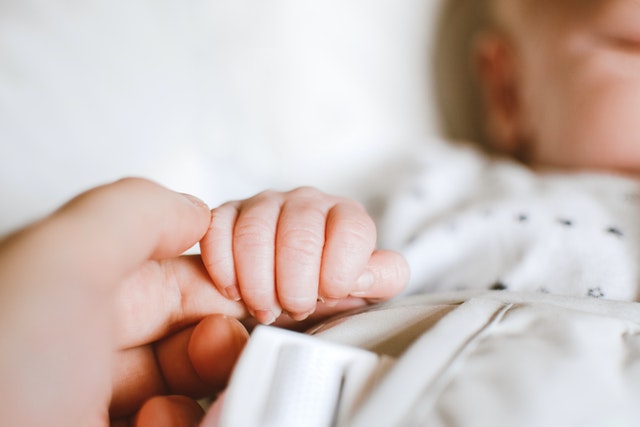A new study investigated neurodevelopment in children born to mothers who tested positive for COVID-19 during pregnancy.
Despite being a respiratory virus, a growing body of research suggests that the effects of COVID-19 may go beyond the respiratory system. The symptoms of COVID-19 can vary significantly, and some people, particularly those who develop post-COVID conditions, may experience a variety of complications. For example, some neurological symptoms may include brain fog, headache, and sleep problems, among others.1
The prevalence of these complications poses the question of whether SARS-CoV-2 infection could impact fetal brain development.2 Some studies suggest that maternal infection from other pathogens during pregnancy may be associated with neurodevelopmental complications for the fetus, even if these pathogens do not cross the placental barrier.2,3,4 The mechanism behind this potential relationship is not fully established and more research is needed on this topic; however, the inflammation that the body generates in response to pathogens may produce adverse conditions for a developing fetus in some situations.2,5
It is currently unknown whether COVID-19 in pregnancy is associated with neurodevelopmental effects for the fetus. To investigate this, a study was performed and published in JAMA Network Open.5
Researchers gathered data from two academic medical centers and six community hospitals across the United States. To screen for the presence of COVID-19 during pregnancy, researchers first analyzed whether mothers tested positive on a laboratory polymerase chain reaction (PCR) test for SARS-CoV-2 at any point during pregnancy. The outcome of interest was whether their children were diagnosed with a neurodevelopmental disorder within the first 12 months of age.5 These two variables were compared to determine whether any associations were present.
Overall, researchers analyzed 7772 live births from 7466 pregnancies, and the average age of the mothers during pregnancy was 32.9 years.5 222 infants were exposed to SARS-CoV-2 during pregnancy and 7550 infants were not. The mothers who tested positive for COVID-19 during pregnancy were more likely to have public insurance instead of private, and this group also had an increased rate of preterm delivery.
The study found that 14 of the 222 infants exposed to SARS-CoV-2, or 6.3%, received a neurodevelopmental diagnosis within the first 12 months of age. By comparison, 227 of the 7550 infants who were not exposed, or 3.0%, received a neurodevelopmental diagnosis within the first 12 months of age. The most commonly observed diagnoses were related to motor function, language, and speech.
It is important to note that this study has some limitations; firstly, the presence of neurodevelopmental diagnoses was determined at only 12 months of age. This may affect the accuracy of the results, as many neurodevelopmental disorders, such as Autism Spectrum disorder, are diagnosed later in childhood.5 Additionally, the study only measured rates of official diagnoses of COVID-19 and neurodevelopmental disorders, so undiagnosed cases may not be accounted for.
Within this study population, diagnoses of neurodevelopmental disorders were more common in infants exposed to SARS-CoV-2 in utero. More research is needed to determine whether SARS-CoV-2 infection during pregnancy is associated with an increased risk of neurodevelopmental disorders in offspring. Additionally, more research is needed to establish how to address any potential effects of COVID-19 in pregnancy on fetal development if any are present.
References
- Centers for Disease Control and Prevention (2022, May 5). Long COVID or Post-COVID Conditions. U.S. Department of Health & Human Services. Accessed 2022, June 16, from https://www.cdc.gov/coronavirus/2019-ncov/long-term-effects/index.html
- Shook, L.L., Sullivan, E.L., Lo, J.O. (2022, April 1). COVID-19 in pregnancy: implications for fetal brain development. Review 28(4): P319-330. Doi: 10.1016/j.molmed.2022.02.004
- Al-Haddad, B.J.S., Jacobsson, B., Chabra, S., et al (2019, March 6). Long-term risk of neuropsychiatric disease after exposure to infection in utero. JAMA Psychiatry 76(6): 594-602. Doi: 10.1001/jamapsychiatry.2019.0029
- Cordeiro, C.N., Tsimis, M., Burd, I. (2016, March 17). Infections and brain development. Obstet Gynecol Surv 70(10): 644-655. Doi: 10.1097/OGX.0000000000000236
- Edlow, A.G., Castro, V.M., Shook, L.L., et al (2022, June 9). Neurodevelopmental outcomes at 1 year in infants of mothers who tested positive for SARS-CoV-2 during pregnancy. JAMA Netw Open 5(6): e2215787. Doi: 10.1001/jamanetworkopen.2022.15787
Photo by Lisa Fotios at Pexels



